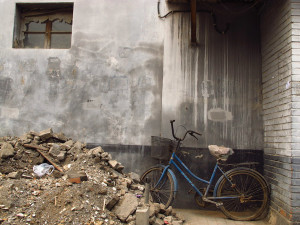There are some faces that are impossible to forget. You cross paths with a stranger from a different world for a split second and sometimes they never leave you, burned into your memory. Today I’m thinking about that woman in Beijing — slow, focused and alone. I came across her on my first morning in the city, where I happily hung out for 10 days while in visa purgatory.
I stayed in a quiet neighborhood near Tiananmen Square. On day one I made my way through the ancient side streets to what would become my go-to lunch stop, where I chose from the dozens of skewered vegetable and mystery tofus. They would grill or fry my selection, drop it on a plate and I would sit out on the street and people watch or, as a foreigner in China, be people watched. This became my routine.
With over 20 million individuals crammed into one city, you’re bound to see some interesting characters, my least favorite being the homeless man with the potbelly who tried to spit on me every time I walked by.
Heading back to the guesthouse on that first day I noticed someone passing out of the corner of my eye. I turned and stared at her back as she walked away — just a tiny, white-haired woman pushing someone in a wheelchair. I kept going, not able to put my finger on what it was about her that had startled me.
The next day, I saw her again from afar. She looked even smaller than I remembered. With her hunched back, she came up to my belly button.
Later that afternoon I waited for her to return. At the time I didn’t know I was waiting, but now I’m sure I was. I sat on the steps of the guesthouse, probably daydreaming about which skewers I would eat tomorrow. Then I heard the distant shuffling, like the scraping of sandpaper. I tried to act cool and looked up without moving.
There she was, the miniature woman who I couldn’t get out of my head and now I realized why. Sure she was ancient and dressed in traditional Chinese robes, which is fascinating enough against the backdrop of ultra-modern Beijing, but that wasn’t it. The wheelchair she was pushing was rusted, squeaky and above all, empty. That’s what I’d seen out of the corner of my eye two days before. An old woman, alone, pushing an empty wheelchair.
I saw her each of the remaining 10 days and I wanted to know her story. Why did she push that wheelchair? Was she pushing the ghost of a loved one? Was it a comfort? Was it a walking cane,? Was she picking someone up? I became obsessed but knew I’d never get my answers, so I made up my own story of how this all came to be:
Once there was a Chinese girl from a small village in the countryside of Liaoning. When she was sixteen she met a nice boy who she could love and, with her family’s blessing, they were married. But they were cursed, and life got harder and harder. The family’s vegetable stand dried up with the soil, so the girl and her nice boy left for Beijing.
As she predicted, they grew to love each other and had a son who eventually left them for a newer and brighter city. The girl and the boy shriveled and shrank until they were old. The boy, trapped in this frail, leathery body, started to put soap in the fridge and leave the house without his shoes on.
He continued to lose more important skills and memories until the only two things he could remember were his wife and his garden as a child. Everyday she would put him in his wheelchair and take him to visit the garden that grew next to one of the city’s aqueducts. One hour there, one hour back. As she got older, the distance seemed to grow. But it was worth it.
Every time he saw the flowers growing through the dry soil he smiled and was himself again.
After five years of sorrow and cloudiness, he died. The physical strain of pushing him to the garden and back each day had taken its toll. Crippled, weak and housebound, she eventually couldn’t take the solitude any more. She noticed the wheelchair in the corner, which had over time become a side table.
She cleared it off and gingerly rolled it out the door and up the street in silence, as she’d always done with her husband. When her body gave way to exhaustion she sat down on the wheelchair for a five-minute break, then started again. In this way, with the support of the chair, she finally made it to the small garden.
Panting, she sat and smiled, and was herself again.







No Comments